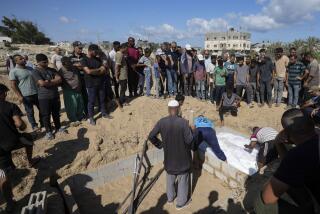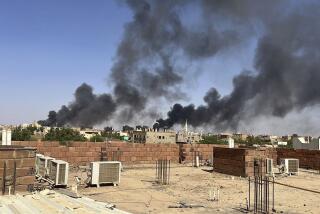Libya says mass grave may contain Abu Salim prisoners
Reporting from Tripoli, Libya — Libya’s new rulers said Sunday that investigators had found the site of a mass grave believed to contain human remains from what many here regard as one of Moammar Kadafi’s signature crimes — the 1996 massacre of about 1,200 inmates at Tripoli’s notorious Abu Salim prison.
Street demonstrations in the eastern city of Benghazi by relatives of those who died in the massacre provided a catalyst for the nationwide protest movement that erupted in February. The protests evolved into an armed insurrection that eventually toppled Kadafi after more than 40 years of authoritarian rule.
For years, kin of those who disappeared had been pressing the government to disclose what happened to the prisoners.
On Sunday, a military spokesman for Libya’s provisional government told reporters here that the burial site appears to have been discovered — a desert tract scattered with bone fragments outside the prison complex. Rumors had long circulated that the bodies had been interred near the prison.
The site was identified through information obtained from witnesses and former prison security guards captured after Kadafi fled Tripoli, officials said.
Provisional government officials say they plan to seek international assistance in excavating the site and identifying the remains through DNA analysis.
Libya’s new rulers are keen to clarify what exactly happened at Abu Salim. The provisional government has said it wants to capture Kadafi and his associates and put them on trial for crimes committed during his rule, including killings at Abu Salim.
A trial could determine whether Kadafi ordered the killings or was even aware of them at the time. Witnesses have said Kadafi’s security chief, Abdullah Sanoussi, who is also the deposed leader’s brother-in-law, appeared at the prison the day before the killings of most inmates and probably ordered the executions.
Witnesses have said that most of those killed were shot in courtyards at the prison on the morning of June 29. The day before, prisoners protesting conditions had taken several guards hostage and clashes had occurred within the prison’s walls.
Abu Salim was long a lockup and interrogation center for political dissidents, especially Islamists bent on ending Kadafi’s autocratic rule. In recent years, the government had acknowledged that excess force had been used, and had even notified some families of the deaths of their loves ones.
In 2004, Kadafi acknowledged that killings had occurred at the prison and opined that the victims’ relatives had a right to know what had happened to their sons and husbands, noted Human Rights Watch, the New York-based group that has studied the issue. Kadafi’s son, Seif Islam, has also acknowledged that mistakes were made and was said to have favored some form of compensation for families of the massacre victims.
Moammar Kadafi, Seif Islam and Sanoussi are all fugitives. The International Criminal Court in The Hague has issued arrest warrants for the three for alleged crimes against humanity committed during the bloody crackdown on street protests this year.
Elsewhere in Libya, authorities of the provisional government said Sunday that pro-Kadafi militants apparently used neighboring Algeria as a base to attack the isolated town of Ghadames, about 300 miles southwest of Tripoli near the Algerian border. The Associated Press quoted an official from Ghadames as saying six people had been killed and 63 wounded.
A military spokesman in Tripoli, Col. Ahmed Bani, told reporters that revolutionary forces had repelled the attackers, who fled back across the border.
Whether the attack was an isolated incident or signaled the beginning of cross-border guerrilla warfare by Kadafi loyalists remained unclear. Kadafi has urged his followers to fight on against Libya’s new leaders.
Revolutionary forces are battling to oust pro-Kadafi forces from two cities — the northern coastal town of Surt, Kadafi’s hometown, and the desert city of Bani Walid, about 90 miles southeast of the capital. Fighters launched a new offensive Saturday against Surt but met stiff resistance from pro-Kadafi forces. North Atlantic Treaty Organization aircraft have been heavily bombing what the alliance calls military targets in Surt, citing a crisis among civilians in the city.
More to Read
Sign up for Essential California
The most important California stories and recommendations in your inbox every morning.
You may occasionally receive promotional content from the Los Angeles Times.










